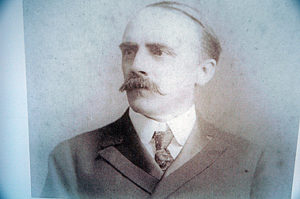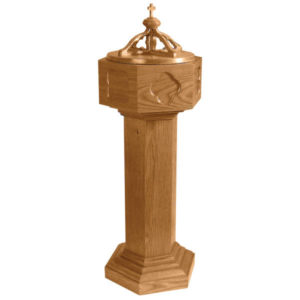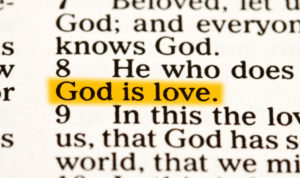Lord, ‘Tis Not That I Did Choose Thee
John 15:16; Ephesians 2:8–9; 1 Peter 2:9–10; 1 John 4:10, 19
(Lutheran Service Book 573)
This coming Sunday our second distribution hymn will be “Lord, ‘Tis Not That I Did Choose Thee” by Josiah Conder (1789-1855). This hymn was in the Evangelical Lutheran Hymn Book and The Lutheran Hymnal, but not in Lutheran Worship. So it has made a reappearance “by popular demand.”
 Conder, the fourth son of Thomas Conder, a London bookseller, was born in Falcon Street, Aldersgate, September 17, 1789. Josiah was a prominent London Congregationalist, an abolitionist, and took an active part in seeking to repeal British anti-Jewish laws. At fifteen he was able to become an assistant to his father in his bookstore. On reaching the age of 21 (in 1811), he took over the family business. A short time later, Josiah married Joan Elizabeth Thomas (‘Eliza’), one of his circle of friends with whom he had initially formed a literary association in 1810 to jointly contribute to the book, The Associate Minstrels. He was the author of several prose works that were popular in his day. In 1812 he contributed three hymns to Dr. Collyer’s collection; and in 1836 he edited The Congregational Hymn-Book. A Supplement to Dr. Watt’s Psalms and Hymns, which contained fifty-six of his own hymns; and in 1851 he published a revised edition of Dr. Watts’s Psalms and Hymns. Conder’s work at the family bookshop soon came to an end (c.1819), after wider recognition of his literary talents had led to him being offered the editorship of The Eclectic Review, a prestigious literary journal that he continued to edit for twenty years (1814–37). With strong Congregational links [don’t think of modern American Congregational congregations but of hard-core Calvinists], he was also invited to edit The Patriot, a newspaper that espoused nonconformist and evangelical causes, and for which he was editor for twenty-three years (1832–55). He died December 27, 1855. In the year after his death, his poems and all his hymns, already completely revised by him before his death, were published under the title of Hymns of Praise, 1856.
Conder, the fourth son of Thomas Conder, a London bookseller, was born in Falcon Street, Aldersgate, September 17, 1789. Josiah was a prominent London Congregationalist, an abolitionist, and took an active part in seeking to repeal British anti-Jewish laws. At fifteen he was able to become an assistant to his father in his bookstore. On reaching the age of 21 (in 1811), he took over the family business. A short time later, Josiah married Joan Elizabeth Thomas (‘Eliza’), one of his circle of friends with whom he had initially formed a literary association in 1810 to jointly contribute to the book, The Associate Minstrels. He was the author of several prose works that were popular in his day. In 1812 he contributed three hymns to Dr. Collyer’s collection; and in 1836 he edited The Congregational Hymn-Book. A Supplement to Dr. Watt’s Psalms and Hymns, which contained fifty-six of his own hymns; and in 1851 he published a revised edition of Dr. Watts’s Psalms and Hymns. Conder’s work at the family bookshop soon came to an end (c.1819), after wider recognition of his literary talents had led to him being offered the editorship of The Eclectic Review, a prestigious literary journal that he continued to edit for twenty years (1814–37). With strong Congregational links [don’t think of modern American Congregational congregations but of hard-core Calvinists], he was also invited to edit The Patriot, a newspaper that espoused nonconformist and evangelical causes, and for which he was editor for twenty-three years (1832–55). He died December 27, 1855. In the year after his death, his poems and all his hymns, already completely revised by him before his death, were published under the title of Hymns of Praise, 1856.
Conder’s best know hymns are, “Bread of Heaven, on Thee We Feed,” “Day by Day the Manna Fell,” and “The Lord is King, Lift Up Thy Voice.” They can be found in any number of Reformed hymnals.
Our version of “Lord, ‘Tis Not That I Did Choose Thee” comes from the Australian Lutheran Hymn-Book of 1925 in which the second verse was altered to remove the Calvinistic theology. This is the only hymn by Conder in our hymnal.
So you don’t have to pull out your hymnal, the text follows:
Lord, ’tis not that I did choose Thee;
That, I know, could never be;
For this heart would still refuse Thee
Had Thy grace not chosen me.
Thou hast from the sin that stained me
Washed and cleansed and set me free
And unto this end ordained me,
That I ever live to Thee.
It was grace in Christ that called me,
Taught my darkened heart and mind;
Else the world had yet enthralled me,
To Thy heav’nly glories blind.
Now I worship none above Thee;
For Thy grace alone I thirst,
Knowing well that, if I love Thee,
Thou, O Lord, didst love me first.
Praise the God of all creation;
Praise the Father’s boundless love.
Praise the Lamb, our expiation,
Priest and King enthroned above.
Praise the Spirit of salvation,
Him by whom our spirits live.
Undivided adoration
To the great Jehovah give.
The Bible clearly teaches that we are sinners (Isaiah 64:6; Romans 3:23). Therefore we are unable to “choose” Jesus. Instead Jesus chooses us! Jesus said in John 15:6, “You did not choose me, but I chose you”. There is nothing new about this. In last weeks Old Testament lesson (Deuteronomy 7:6-9) Moses told the Israelites “the Lord your God has chosen you.” Moses goes on to make it clear that the choosing had nothing to do with how special the people were but everything about God being faithful to his own promise. This thought comes through very strongly in verses one and two. Verse three is basically a doxology.
In Ephesians 1:4, Paul writes, “even as he (the Father) chose us in him (the Son) before the foundation of the world”. Here we again meet the truth that we are chosen by God and not the other way around. Paul adds that the choosing is in Jesus, as our Lord said in John 15:6. What the Father wants, so does the Son and the Spirit. That is because they are one Lord, one God. So in union they call us. Indeed, Luther’s Small Catechism tells us that the Holy Spirit “calls, gathers, enlightens and sanctifies us in the one true Christian Faith.”
This calling comes through Word and Sacrament. The power of the word can be seen in passages like Acts 6:7 and Romans 10:7. The powerful, creative, Word creates faith in the hearer just as surely as the powerful, creative, Word created the heavens and the earth (Genesis 1 & 2). Conder alludes to the Word in verse one when he speaks of Christ calling and teaching us.
 The Sacraments (whether you number them as Baptism and the Lord’s Supper only or add Absolution) also create faith. Paul, in writing about Baptism, says we are raised from the waters of Baptism in faith (Colossians 2:12). Peter bluntly says, “Baptism now saves you” (1 Peter 3:21). You might also want to look up Acts 2:38 where Peter is equally blunt. Now we know that Scripture teaches we are saved by grace alone through faith alone so, if baptism saves, then baptism must work faith (Ephesians 2:8-9). In baptism, Christ chooses us. Conder refers to this in verse one with the words “Washed and cleansed and set me free.” The washing is Baptism.
The Sacraments (whether you number them as Baptism and the Lord’s Supper only or add Absolution) also create faith. Paul, in writing about Baptism, says we are raised from the waters of Baptism in faith (Colossians 2:12). Peter bluntly says, “Baptism now saves you” (1 Peter 3:21). You might also want to look up Acts 2:38 where Peter is equally blunt. Now we know that Scripture teaches we are saved by grace alone through faith alone so, if baptism saves, then baptism must work faith (Ephesians 2:8-9). In baptism, Christ chooses us. Conder refers to this in verse one with the words “Washed and cleansed and set me free.” The washing is Baptism.
As far as the Lord’s Supper is concerned, Luther correctly observed that, when Jesus said of the meal that we receive his body and blood which is shed “for you,” the words “for you” require faith. We might also point out that, as Jesus said the meal was “for the forgiveness of sins,” and, as we have seen, forgiveness of sins is received only by faith, it becomes clear that the Eucharist is a meal that builds and strengthens faith. Conder may well be referring to the Lord’s Supper in verse two when he says, “For Thy grace alone I thirst.” You might also want to look up Isaiah 43:20.
Absolution is a means of Grace by which forgiveness is offered (John 20:23; 2 Corinthians 2:10). Because it doesn’t have a physical element (like Baptism and the Supper), some do not consider Absolution a Sacrament. All Lutherans, though, agree that the word of forgiveness used in Absolution conveys what God promises, that is, forgiveness. As the Bible never defines the word “sacrament,” we leave its definition and how many there are as “open questions.” Because Absolution is simply a specific application of the Word, references to the Word can also be thought of as applying to Absolution.
At any rate, in all these ways (Word and Sacrament) Christ comes to us with the gift of faith, the gift of forgiveness, the gift of renewal. We see in them God’s grace in action and they are nothing short of miracles. Through these “Means of Grace” God calls to a wayward humanity. Through the Means of Grace, God chooses us.
In verse two Conder says, “And unto this end ordained me, That I ever live to Thee.” To be “ordained” is typically understood as how a person is placed into the office of the public ministry of Word and Sacrament. It would be analogous to being anointed in Old Testament days. Those who were anointed (ordained) were prophets, priests and kings. Perhaps this is why the hymn reminds us in verse three that Jesus is our Priest and King. The hymn depicts this ordaining as happening when we are baptized.
Perhaps Conder had in mind passages like Exodus 19:6 and 1 Peter 2:9-10.
… and you shall be to me a kingdom of priests and a holy nation.’ These are the words that you shall speak to the people of Israel.” (Exodus 19:6)
But you are a chosen race, a royal priesthood, a holy nation, a people for his own possession, that you may proclaim the excellencies of him who called you out of darkness into his marvelous light. Once you were not a people, but now you are God’s people (1 Peter 2:9–10)
One might also like to look up Revelation 1:6, Revelation 5:10, Isaiah 61:6 and Isaiah 66:21.
We see Peter (and John) easily using Old Testament names for Israel for the New Testament people of God. The Church is Israel, the continuation of the people of faith in the One True God. The meaning of when Peter says we were once “not a people” but now we are “God’s people” is straight forward. Once we were aliens and foreigners to God’s kingdom (Ephesians 2:12, 19, Colossians 1:21). Now, because God has chosen us in his grace, we are citizens of his kingdom. We are Israel.
What might not be so obvious is that Peter is using an Old Testament name. This can be found in the book of Hosea and St. Paul picks up on it in the book of Romans.
She conceived again and bore a daughter. And the Lord said to him, “Call her name No Mercy, for I will no more have mercy on the house of Israel, to forgive them at all. (Hosea 1:6)
And the Lord said, “Call his name Not My People, for you are not my people, and I am not your God.”
Yet the number of the children of Israel shall be like the sand of the sea, which cannot be measured or numbered. And in the place where it was said to them, “You are not my people,” it shall be said to them, “Children of the living God.” (Hosea 1:9-10)
and I will sow her for myself in the land.
And I will have mercy on No Mercy,
and I will say to Not My People, ‘You are my people’;
and he shall say, ‘You are my God.’” (Hosea 2:23)
As indeed he says in Hosea,
“Those who were not my people I will call ‘my people,’
and her who was not beloved I will call ‘beloved.’”
“And in the very place where it was said to them, ‘You are not my people,’
there they will be called ‘sons of the living God.’” (Romans 9:25, 26)
But I ask, did Israel not understand? First Moses says,
“I will make you jealous of those who are not a nation;
with a foolish nation I will make you angry.” (Romans 10:19)
The people of God are not just ethnic Jews who have come to faith in Jesus, but all who have been chosen by God in Christ to believe in our Lord, all who have been baptized into Jesus.
 In 1 John 4:8, we find a famous description of God; “God is love.” The Greek word translated “love” is “agape.” This is a selfless giving without any thought of reciprocation. In verse 10 we read “In this is love, not that we have loved God but that he loved us and sent his Son to be the propitiation for our sins.” In some translations the word Greek word translated “propitiation” in the ESV is translated “expiation.” We find it in verse three of our hymn. This echoes John 3:16 were we are told that God so loved the world that he gave his only-begotten Son to be our savior. It is because of this underserved love of God in Christ Jesus that we in turn love others, as the second great commandment tells us to do (Leviticus 19:18; Matthew 22:39). So John tells us in verse 19, “We love because he first loved us.” By ourselves, of course, we do not and can not keep this commandment. But, the Holy Spirit enables us to love (Romans 5:5; 15:30; 2 Corinthians 6:6; Galatians 5:22). Both our love of God and our love of neighbor flows from God’s love for us and is enabled by the Holy Spirit.
In 1 John 4:8, we find a famous description of God; “God is love.” The Greek word translated “love” is “agape.” This is a selfless giving without any thought of reciprocation. In verse 10 we read “In this is love, not that we have loved God but that he loved us and sent his Son to be the propitiation for our sins.” In some translations the word Greek word translated “propitiation” in the ESV is translated “expiation.” We find it in verse three of our hymn. This echoes John 3:16 were we are told that God so loved the world that he gave his only-begotten Son to be our savior. It is because of this underserved love of God in Christ Jesus that we in turn love others, as the second great commandment tells us to do (Leviticus 19:18; Matthew 22:39). So John tells us in verse 19, “We love because he first loved us.” By ourselves, of course, we do not and can not keep this commandment. But, the Holy Spirit enables us to love (Romans 5:5; 15:30; 2 Corinthians 6:6; Galatians 5:22). Both our love of God and our love of neighbor flows from God’s love for us and is enabled by the Holy Spirit.
So we join with Conder in praising the Father, Son and Holy Spirit, who created us, redeemed us, gave us his means of grace, made us his people, and will bring us to glory, all because he loves us. Amen.
